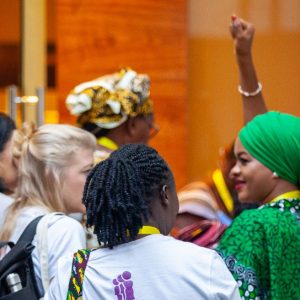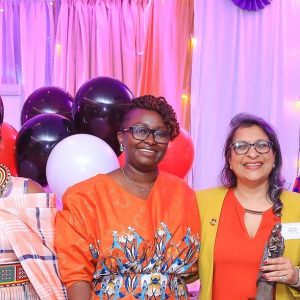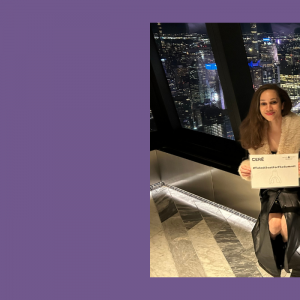One of the hardest things I have had to face in life was becoming an advocate against female genital cutting (FGC), especially because I live it; I am a survivor. I was cut at age six and underwent type III, or infibulation. As such, it is something I identify with so much, and I want it to end so badly. Unfortunately, it is not that easy. What makes it more complicated is the fact that this practice is wrapped with Islam and presented as Islamic within the Somali community, which I am a part of. The efforts to unwrap the two are heart-wrenching and heavy.
In April 2019, together with another renowned activist, I facilitated a Knowledge Sharing Workshop, supported by Orchid Project, for a group of 20 participants in Garissa, Kenya. They were made up of mainly religious scholars, civil society workers and government officials. The main objective was to deliberate on, and create, guidelines for engaging with religious scholars to aid the abandonment of FGC. Religion is a very emotive subject and anything presented as religious is accepted most times without question. FGC is one of those subjects that is often covered with the ‘it is religious’ banner in the Somali community. As a result, the religious scholars are key gatekeepers and, hopefully, trusted allies to help us remove this banner that was mounted to FGC centuries ago.
It is not enough to have scholars come to grace a one-off meeting or a workshop and or engage them in an ad hoc manner.
The workshop turned out to be very interesting and the objective was achieved. I had some nerves as we prepared for the workshop. I did not want to find ourselves in the same space like we were decades ago, arguing whether or not FGC was Islamic or not. I never voiced my concerns because I really wanted this workshop to take place and I could not be the one sabotaging it. Putting on a brave face and drawing from the many lessons I learnt in this struggle, I forged ahead. Luckily, it was a very mature space and my nerves were calmed in the end. I was encouraged to find that the religious scholars were on the same page of wanting to delink FGC from Islam. The space also allowed us to share with some newcomers into the discourse around FGC and Islam, since we had a knowledgeable scholar in the space who took them through this aspect.
As we developed the guidelines, it was all fun and interactive. Religious scholars are very crucial in the end FGC campaign and for the longest time, civil society organisations and activists have engaged them haphazardly. It is not enough to have scholars come to grace a one-off meeting or a workshop and or engage them in an ad hoc manner. The guidelines we created in this workshop are expected to provide a systematic step-by-step way of engaging the religious scholars, especially because many of these scholars are brought up in the same communities we are focused on, and are socialised in the same culture.
FGC is a norm in the community, religious scholars thus require special attention to understand that FGC is a violation of the rights of girls and women, and more importantly, they need support to question the practice from an Islamic perspective. We need a critical mass of religious scholars who are convinced of the non-Islamic nature of FGC and who take advantage of the platform they are on to speak out in support of FGC abandonment.
I am living proof of the role religious education plays in changing mindsets. I was brought up believing that FGC was Islamic, and that all Muslim girls are cut. I believed this until I met Muslim girls who were not cut.
Together, we produced draft guidelines that covered the logistics of engaging religious scholars (how to find them, how to get to them, etc) to practical guidelines on how to engage in dialogue with religious scholars, for example, one need not delve directly into talking about FGC; the scholars at the workshop recommended against this. Different topics are suggested in the guidelines that work to demystify various issues, e.g. it is suggested that plenty of space and time is given to deliberate and discuss FGC and Islam. These guidelines are forthcoming and will be published in conjunction with Orchid Project.
It is our hope that these guidelines will help many organisations and individuals who work on ending FGC. Engaging religious scholars and having them lead the end FGC campaign is an ultimate goal in communities where this practice is considered religious. I am living proof of the role religious education plays in changing mindsets. I was brought up believing that FGC was Islamic, and that all Muslim girls are cut. I believed this until I met Muslim girls who were not cut. That was the beginning of a long journey of seeking the answer to the question, “what is Islamic about this practice?”.
It is my hope that every other person who might have those same beliefs today will be helped to know that FGC has no place in Islam and in fact it violates a lot of Islamic teachings. Working with religious scholars to delink FGC from Islam is a strategy that I believe is key for the Somali community and others who wrap up this practice with Islam. I believe with the right strategies and relentless commitment to this campaign, FGC will end one day.
Maryam Sheikh Abdikadir is a social change activist and community mobilizer. She has over 20 years of programme work experience with the UN and NGOs in the areas of gender, child protection and cultural norms change. She is an ardent agitator for FGM abandonment and storytelling for social change enthusiast. She holds a Master of Arts in Development Studies from the University of Nairobi and a Bachelor of Education from Moi University. Right now Maryam is working on her PhD studies in Canada.






